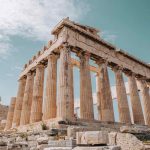
Our Southern European road trip brought us to Greece. As we travelled around the landscape of beaches and mountains, by road and on foot, visiting tiny villages and ancient sites we constantly rediscovered the rich stories of this land. There are so many reasons, both ancient and modern, why Greece has continuously maintained its position as a top travel destination since tourism began. So here are a collection of facts about Greece – A beautiful nation and the nurseryland of our culture.
Facts about Greece – Introduction
Greece enjoys ideal weather, beautiful beaches and dynamic sea views dotted with the picturesque blue silhouettes of uncountable islands. From Tzatziki to Souvlaki – Greek food is delicious and unpretentious. The ancient Greeks developed the earliest roots of western civilisation, including art, science, philosophy, architecture, written language, democracy, theatre, storytelling and poetry. Their civilization stretched throughout the Mediterranean from Spain in the west to Ancient Troy in modern Turkey in the east – (Alexander the Great even got as far as India), and this has left us with numerous Greek cultural sites and Landmarks to explore – each one rich in stories and fascinating facts.
Quick Facts about Greece
| GREECE QUICK FACTS | |
| official name | Hellenic Republic |
| size | 131,957 km2 |
| population | 10.7 million |
| official language | greek |
| capitol | Athens |
| religion | Greek Orthodox |
| flag | nine horizontal stripes of blue and white, and with a white cross on a square blue |
| anthem | «Ύμνος εις την Ελευθερίαν» “Hymn to Liberty” |
| famous sites | Parthenon Temple, Acropolis, Olimp, |
Greece – The Nation, its Language and Symbols
Hellas or Greece? – The Greeks don’t refer to their country as Greece, but as Hellas or Hellada. The English word Greece comes from the Latin “Graecia”, which translates as “The land of the Graeci”. This was the name of the first western Greek tribe that the Romans conquered when extending of their empire in this direction.
Greece Official name – The official name of the country is the Hellenic Republic since the abolition of the Greek monarchy in 1973.
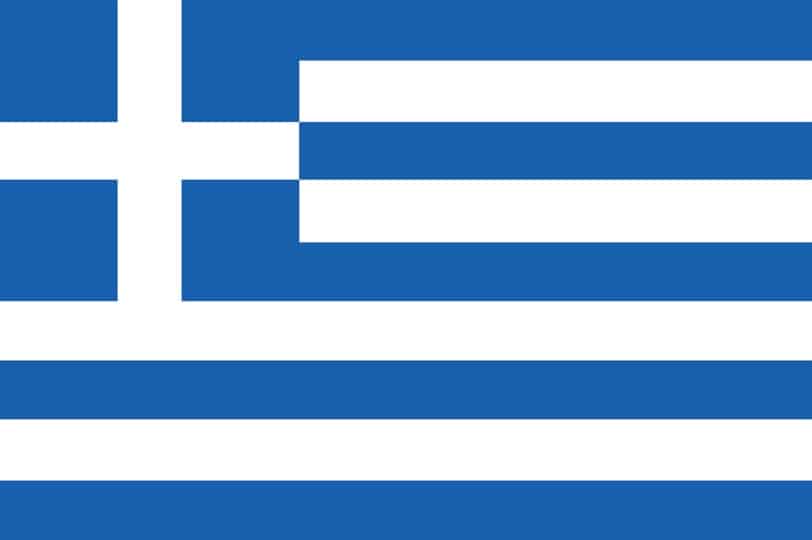
The Greek Flag – The national flag of Greece, is popularly known as the “sky blue and white.” It comprises nine equal horizontal stripes of blue alternating with white, and with a white cross on a square blue ground covering five of the stripes in the top corner nearest the pole. The nine stripes are said to represent the number of syllables in the Greek phrase Eleftheria i Thanatos, translating as Liberty or Death, the battle cry of the final revolt against the Ottoman Occupation in 1821.
Unlike most national flags, there is no official shade of colour stipulated. Any blue may be used.
Population of Greece – The population of Greece is 11 million people, over 40% of whom live in Athens. Greece has the world’s most-native population with about 98% of the entire country’s population coming from native family.
Greeks abroads – According to Australian census, with over 150,000 people being of Greek origin, Melbourne has the largest Greek population of any city outside Greece. That makes Melbourne the sixth biggest city in the world counting by its Greek population. It’s a long way to the Sixth Greek City
Greek Language – Greece’s official language is Greek and it’s spoken by almost the entire population. The Greek language is recognised as impenetrable by English speakers in the phrase “It’s all Greek to me.” However, many English words such as “photograph” and “telescope” have Greek origins.
- European Landmarks
- The Most Interesting Facts about Athens
- Facts about Parthenon
- Movies about Greece
Greek Alphabet – Like Thailand, Greece has its own alphabet. Some Greek letters are similar to the Latin alphabet used by western Europe and the Americas, whilst others are similar to the Cyrillic alphabet used by the Russians and several post-soviet states.
Our English word “Alphabet” derives from “Alpha Beta” the first two letters of the Greek alphabet, although in modern Greek the second letter Beta (Which looks like a “B”) is is pronounced like an English “V”. In modern Greek, the sound of English “B” is spelt using the two Greek letters for MP.
Literacy – There is over 95% literacy level throughout the country, which is a dramatic rise, compared to 30% reported in the 1950s.
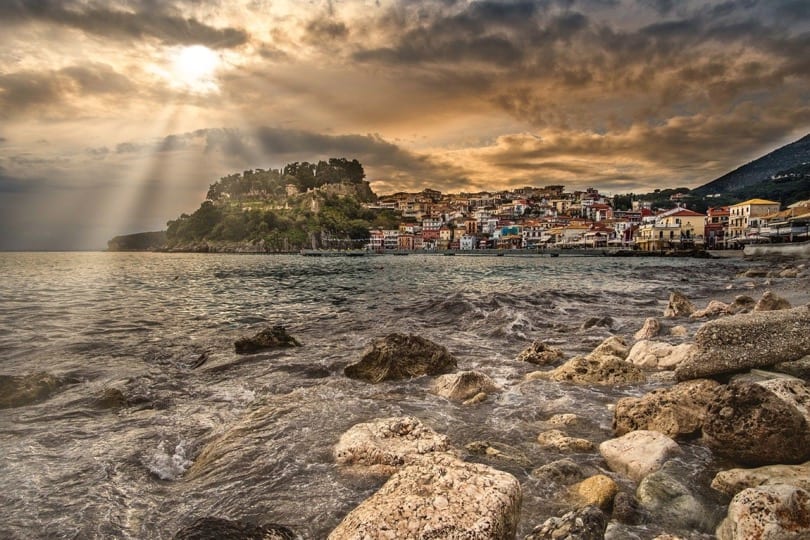
Facts about Geography of Greece
Geo-Physical Regions – The country is divided into three geo-physical regions: the mainland north of Corinth, the Peloponnese, which is the large southern peninsula joined to the mainland by the narrow isthmus of Corinth and its islands . .
Greek Islands – The Greek islands are literally uncountable. The number ranges from about 1,200 to 6,000 depending on the size of the smallest island which qualifies for the name. The number of inhabited islands is again unclear, with estimates ranging between 150 and 250. The names of many of the larger ones well known as historic sites and tourist destinations. Some best-known names include Crete Lesbos Rhodes Santorini, Mykonos, and Corfu. Santorini is home to one of the coolest bookshops in the world.
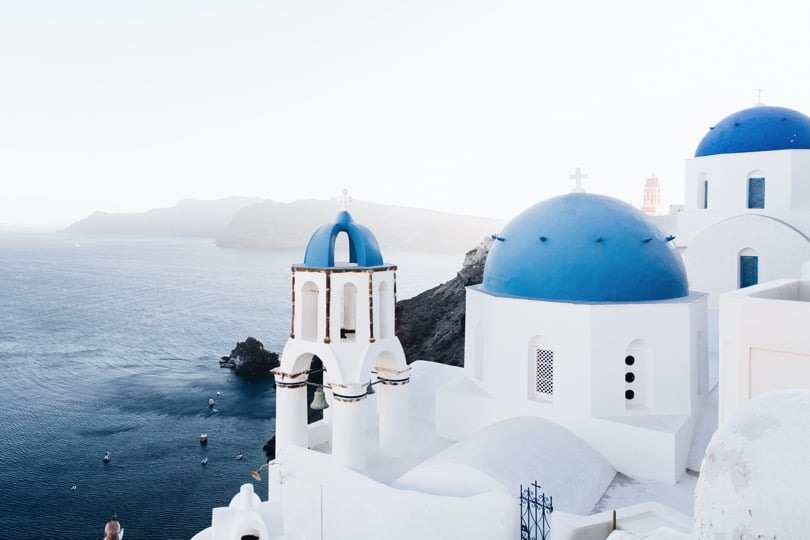
Rivers and Mountains – Numbers of navigable rivers in Greece: zero! There just isn’t enough distance between the mountains and the coast for a river to get together what it takes to become navigable by boats. Nearly 80% of the landmass of Greece is hills and mountains. The highest mountain is Mount Olympus on top of which was once the palace of the ancient gods.
Climate in Greece – Greece is the sunniest country in Europe and among the sunniest on the planet, enjoying an average of about 250 days of sunshine a year.
Biodiversity – Greece has one of the richest varieties of wildlife in Europe. It has 116 species of mammals, 18 species of amphibians, 59 species of reptiles, 240 species of bird, and more than a hundred species of fish. This puts it at the opposite end of the scale from Iceland. When we went there we learnt that the first colonists found only one mammal on the island, the Arctic Fox.
Marble – Some of the temples we visited have solid white marble columns. Greece’s quarries supply about 7% of all marble production worldwide.
Wiggly Coastline – Despite being only the world’s 95th largest country by area, Greece has one of the longest coastlines in the world (13,676 km) and the second-longest coastline in Europe.
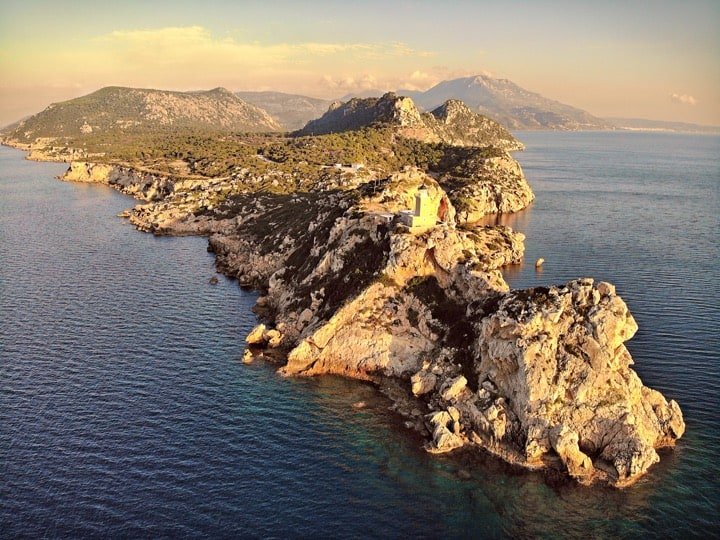

Do you want to learn more about Italy – Read Interesting facts about Italy
Facts about Greek Culture
Saints Days and Names Days
The Greeks celebrate names day as do the Poles. This means that as well as celebrating their own birthday, Greeks celebrate the Saint’s day of the Saint after whom they were named. Exchanging gifts with family and friends takes place usually on these names days.
St Andrew and St George, the patron saints of Scotland and England, are also patron saints of Greece.
Family Culture Greece holds the world record for adults living with their parents. About 60% of adults between 18 and 34 have not yet left home.
Democracy – by Law! Greece has compulsory ballots. Voting is required by law for every citizen of 18 or older. Despite the ancient will of Poseidon, this law applies to women as well as men.
Saying taking the Bull by the Horns Not only the Minoan acrobats demonstrated fearless behaviour when it came to bulls. The English saying “to take the bull by its horns” comes from a Greek myth when Hercules saved Crete from a raging bull by doing just that.
People Live Longer in Greece – at least some of them do! Ikaria is among the world’s rare “Blue Zones”. These are the places where for unknown reasons, people tend to live longer. In Ikaria approximately a third of the populations live past 90 years. The reason for such longer life is still unclear. Maybe it’s the diet, the water or the lifestyle. Only five places worldwide gain the dubious accolade of being known as Blue Zones.
National Holidays in Greece – Greece has only two National Holidays annually.
- Greek Independence Day Greek observe Independence Day on 25th March to celebrate winning the Independence War against the Ottomans in 1821.
- The Oxi Day (Ohi Day) On 28th October 1940 whole Greece celebrate the day when the Greek Prime Minister Ioannis Metaxas said NO (OXI) to Mussolini request to enter the Greece. the refusal means Greece got involved in 2nd World War. Since 1942 Greeks celebrate this day as Oxi Day and take part in parades and put flags in the windows.
Religion in Greece – The official religion of modern Greece is Greek Orthodox Christianity, with 98% of the entire population identifying as practicing Orthodox Christians. Like their alphabets, Greek and Russian Christianity are both similar. I was once told by a Russian that their early bishops brought some of the Greek letters with them together with the Orthodox practices, but I don’t know if there is truth in that.
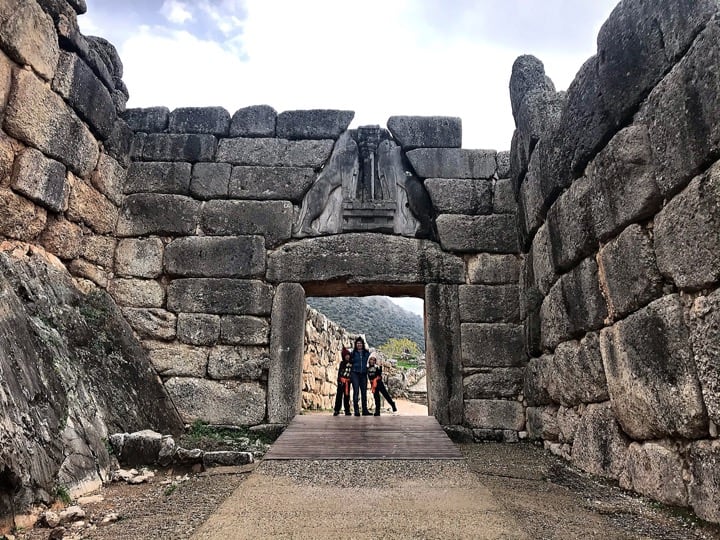
Facts about Ancient Greece
The Minoans – The Earliest Greek Civilisation
The first great civilization in Greece grew up on the island of Crete. The Minoans had their palace at Knossos where wall paintings dated at about 2,000 BC show acrobats making somersaults over charging bulls.
Cyclopean Masonry – The Minoans were conquered by the Myceneans from the Peloponnese in 1450 BC. We visited the ruins of Mycenae, a magnificent hill fortress built from stones so big that they could only have been lifted by giants known as Cyclopses. Some of the walls at Mycenae are 8m thick and some of the stones are as big as 2m high or long. How the Ancient Greeks manage to build the walls we learn in Ancient Greek Technology Museum in Athens.
The Marathon A runner named Pheidippides ran 150 miles in about 500 BC from Marathon to seek help from the legendary Spartans against Xerxes and the Persians. After the Greeks won, Pheidippides ran 25 miles back from Marathon to Athens to announce the victory. And long distance running had gained a new name.
Ancient Greek Armour – The Ancient Greeks lived in what we call the Bronze Age, so their armour was made not of steel but of bronze, an alloy of copper and tin. Bronze isn’t as strong as steel, so you need more of it to give the same protection, which is why Ancient Greeks soldiers carried about 33 Kg of armor in battle.
Early Culture and Shopping Lists – Over the next millennium, what we now call Greece developed as about 1,500 independent city states each with its agricultural lands and fortress or palace. Most of the time these city states traded peacefully with each other and with the outside world, and were secure enough to find time for creative arts and the development of the first writing. Some of the earliest written records we have today were shopping lists scratched onto clay – well not shopping lists exactly but palatial accounts of the numbers of animals and foodstuffs procured for some celebration. The soft clay was accidentally burnt in a fire that destroyed the palace of Nestor, and so it was preserved for twentieth century archaeologists to decipher.
Athens and Democracy in Ancient Greece – The city of Athens named itself in honour of the virgin Goddess of wisdom, craftsmanship, and victory, Athena. Athena won the city from her rival the sea god Poseidon, by a poll of the Gods. The Goddesses voted for Athena, and the Gods supported Poseidon. Athena won by one vote which made Poseidon so angry that violent sea storms threatened the city until he could be pacified. The price that he demanded was that from then on, women should not vote, and so when the citizens of Athens invented the new system of rule known as democracy, only men were allowed in the ballot.
The most powerful city states included Athens, Sparta, Thebes, and Corinth.
Athens – Europe’s Earliest Capital
Although Athens is famous for its history in the first millennium BC the city’s earliest origins were a couple of thousand years older than that, making Europe’s oldest capital city and one of the oldest cities in Europe and the world.
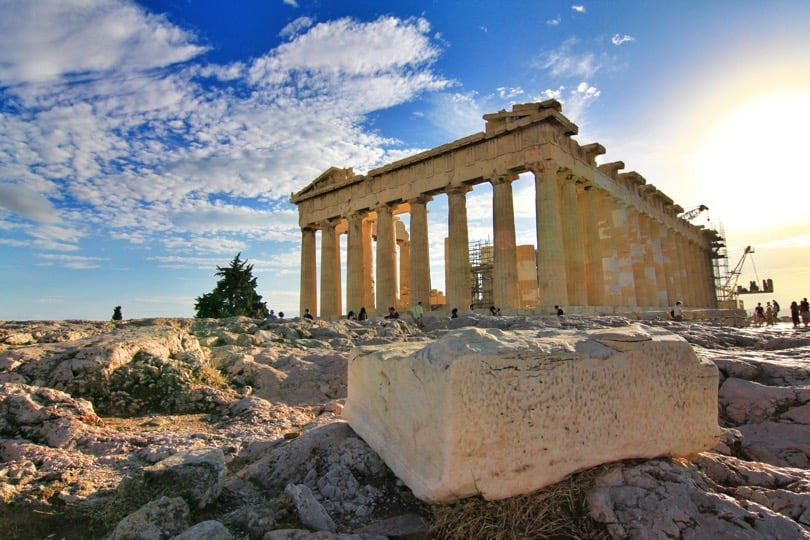
The Olympic Games
- The Olympic Games
By the time Athens invented democracy in about 500 BC, the Olympic Games had already been going for over two hundred years and they would continue every 4 years uninterrupted for another nine centuries after that! The first Olympic games were held in 776 BC the Peloponnese to honour Zeus and the Olympian gods and featured only running, but additional events including, long jump, discus, javelin, wrestling, and chariot racing were gradually added. The place where they were held is called Olympia though it is nowhere near Mount Olympus. - The Modern Olympic Games
The ancient Olympic Games were banned by the Romans in 393 AD, because in honouring Zeus they were un-Christian. But in 1894 a Frenchman thought of reintroducing them in Paris in 1900 to celebrate the new century. His idea was so popular that he was persuaded to bring his plans forward so that Athens could hold the first Olympics in 1896, 4 years before the Paris Olympics of 1900.
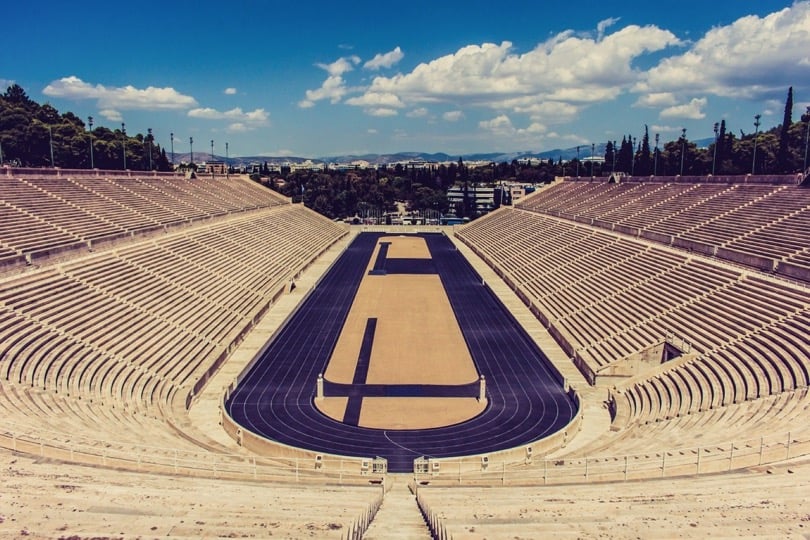
Facts about Greece History
Brief History Two Thousand Years of Foreign Rule
As we all know from the “300” movies, the ancient Greeks repelled Xerxes and his vast Persian army. Several centuries before that, they had won the Trojan War against Ilium (Turkey) with their famous wooden horse, however they weren’t so lucky against the Romans. Greece was conquered by the Roman Empire in the 2nd century BC. The Roman Empire took Turkey too and Constantinople (modern Istanbul) subsequently became the heart of the new Byzantine (Christian) empire including Greece. Constantinople fell to the Moslem Ottomans in the fifteenth Century, and several centuries later, after over two millennia under foreign rule, Greece won independence in 1832.
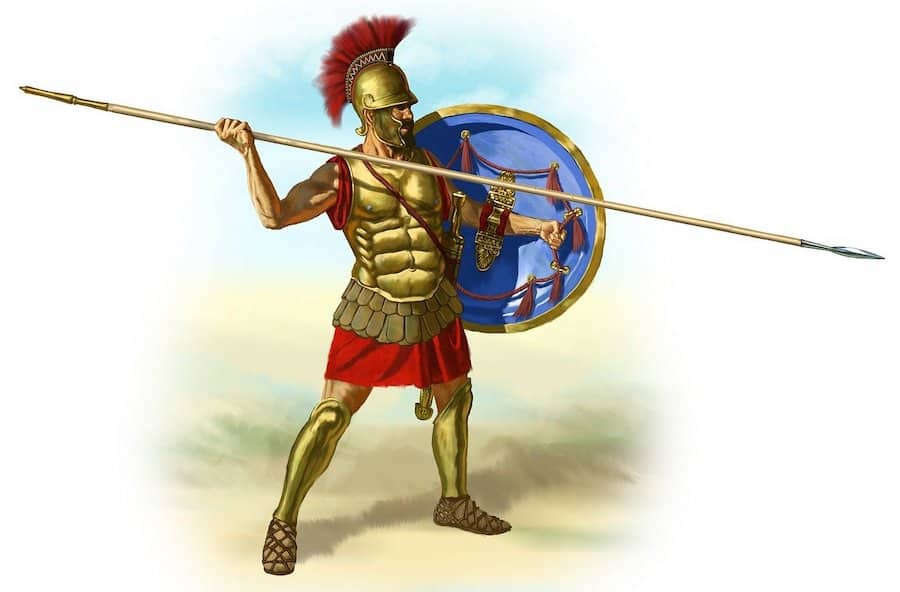
Facts about Tourism in Greece and its Famous Sites
Destination of Choice
Approximately 16.5 million tourists visit Greece annually. More than its total population. Tourism contributes almost 16% of Greece’s national income. (GDP)
The Grand Tour
In the eighteenth and nineteenth centuries, any British family who could afford it would send their sons on a grand tour of Europe when they reached 21 to give them a grounding in culture and classics. Surprisingly perhaps, Greece was not on the Grand Tour’s standard itinerary. The GT beaten track went as far as Naples in Italy as its furthest point. It seems the young British aristocracy got their Classical Greece to fix from the Greek temples at Paestum on the Italian west coast which incidentally are better preserved than almost any Greek temples in Greece with the exception of perhaps being the Temple of Hephaestus in Athens.
Archaeological Sites and Museums
Greece has one of the biggest lists of archeological sites in the world. Not a scientific study but judging by the list in Wikipedia, maybe more than any other. What is clear is that with over 100 archaeological museums, which is more than any other country in the world.
UNESCO World Heritage Sites
Greece is home to 18 UNESCO World Heritage sites. Sixteen of these sites are listed for their cultural criteria including the Temple of Apollo, the Acropolis of Athens, and the Medieval City of Rhodes. The other two, (Mount Athos and Meteora), are inscribed as UNESCO heritage sites for both their cultural and natural significance.
The Parthenon Marbles
At the Acropolis Museum, you can see marble sculptures from the Parthenon, but the set is incomplete. Most of the Parthenon marbles are in the British Museum in London where they are known as the Elgin Marbles. These treasures were “collected” by the British Lord Elgin in 1812, whose actions were immediately condemned by Lord Byron and others as “theft and vandalism”. The controversy in Britain was so great that it was debated by Parliament, with the outcome that Lord Elgin was allowed to keep his collection. But after two hundred years, the fire hadn’t died down. As recently as 2017, Greece threatened legal action against the UK for its return. So far they remain in London Museums.
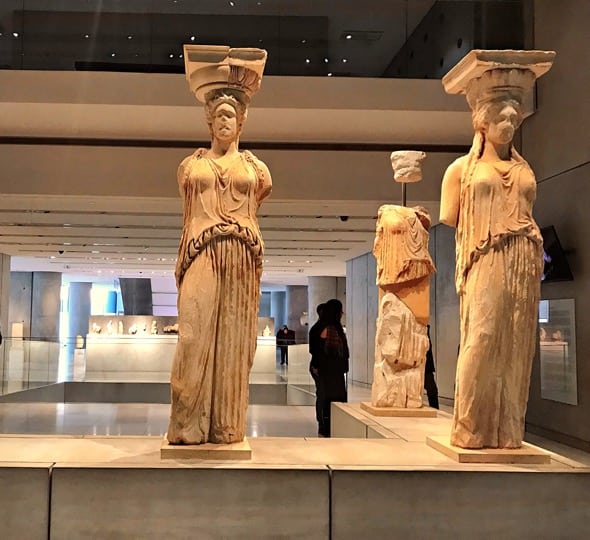
Facts about Greek Culture
- Saints Days and Names Days The Greeks celebrate names day as do the Poles. This means that as well as celebrating their own birthday, Greeks celebrate the Saint’s day of the Saint after whom they were named. Exchanging gifts with family and friends takes place usually on these names days.
- Family Culture Greece holds the world record for adults living with their parents. About 60% of adults between 18 and 34 have not yet left home.
- Democracy – by Law! Greece has compulsory ballots. Voting is required by law for every citizen of 18 or older. Despite the ancient will of Poseidon, this law applies to women as well as men.
- Saying taking the Bull by the Horns Not only the Minoan acrobats demonstrated fearless behaviour when it came to bulls. The English saying “to take the bull by the horns” comes from a Greek myth when Hercules saved Crete from a raging bull by doing just that.
- People Live Longer in Greece – at least some of them do! Ikaria is among the world’s rare “Blue Zones”. These are the places where for unknown reasons, people tend to live longer. In Ikaria approximately a third of the populations live past 90 years. The reason for such longer life is still unclear. Maybe it’s the diet, the water or the lifestyle. Only five places worldwide gain the dubious accolade of being known as Blue Zones.
- Greek Independence Day Greek observe Independence Day on 25th March to celebrate winning the Independence War against the Ottomans in 1821.
- The Oxi Day (Ohi Day) On 28th October 1940 whole Greece celebrate the day when the Greek Prime Minister Ioannis Metaxas said NO (OXI) to Mussolini request to enter the Greece. the refusal means Greece got involved in 2nd World War. Since 1942 Greeks celebrate this day as Oxi Day and take part in parades and put flags in the windows.
- Be Careful how you Wave Greeks always wave with their hand closed. They consider it an insult to show the palm with fingers extended.
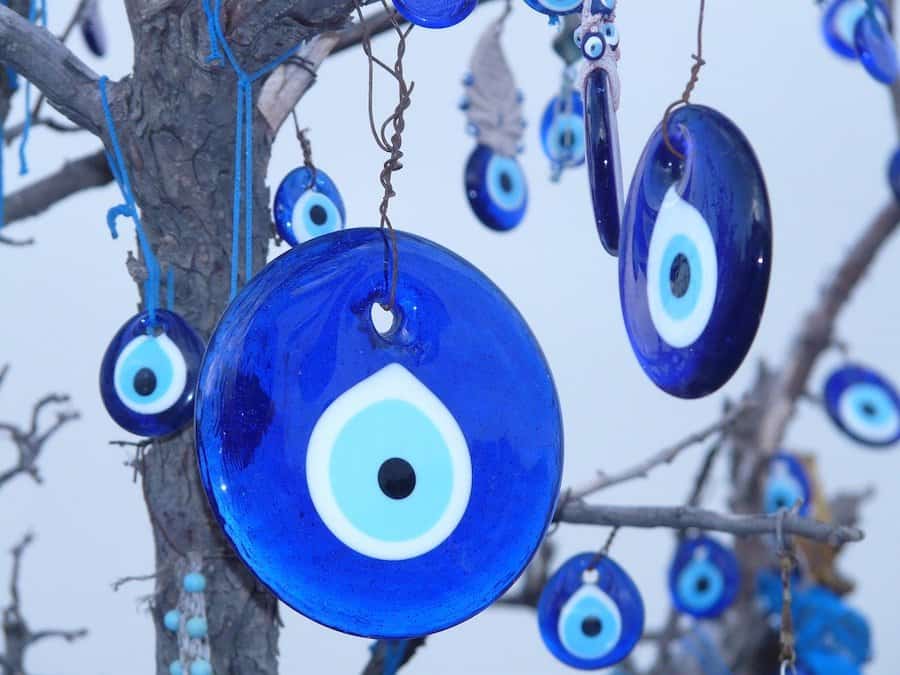
Greek Superstitions
Are Greeks Superstitious? – yes they are. Very. Here is a sampler of some of superstitions in Greece.
- The Evil Eye – The gift shops in Athens, are full of ornaments or jewelry featuring a bright blue eye known as “Mati”. According to the superstition, these eyes will protect you from an angry or a jealous person’s evil eye curse.
- Lucky Coin – Vasilopita’ is a traditional new year cake and contains a coin. If you find the coin in your slice of cake, then you can look forward to all-year good luck.
- Sneezing – If you sneeze, it means that someone is talking about you. Quickly whisper “skordo” (garlic) to make sure they only say good things about you. And you can even find out who it is. Ask someone to choose a three digit number. Add the digits and count along the (Greek) alphabet to find the initial letter of their name.
- Plate Smashing – The Greek custom of smashing plates and glasses at weddings is an opportunity for guests to wish the newlyweds good luck with a chorus of “Oopah!” This ritual also symbolizes abundance.
- Greeks believe that Tuesday the 13th is an unlucky day instead of Friday the 13th
Greek Food and Drink
- The national cheese of Greece is the light white salty goats milk Feta you can find in your salad.
- Ouzo is a spirit distilled from the remnants of grapes after they have been pressed for wine. With a distinctive licorice flavor, ouzo has about the same potency as whisky or gin and is served chilled and drunk neat. It is also used in many Greek recipes.
- Our advice when drinking wine – ask for red. We have had several very nice red Greek wines on our travels. Perhaps it is unfortunate that the first white Greek wine we tasted was Retsina. This wine is flavoured with pine which reminded us of disinfectant. Anyway from that moment on we stuck with red and we weren’t disappointed.
- Traditional Greek Foods which you should try when visiting Greece is Moussaka, Taramasalata, tzatziki. One of the most popular street food is souvlaki with tzatziki sauce – yummy.
- Olives are part of the staple diet in Greece. As the world’s third leading producer of olives after Spain and Italy, the Greeks have cultivated olive trees for food, olive oil, soap and timber since ancient times. Some olive trees planted in the thirteenth century are still producing olives today. Olive oil is staple of greeks meals – plus Olive oil is an important for Greek Economy as Greece is the third largest producer of Oil of Olive in the world

And a Few Random Fun Facts about Greece
- Barbarians The origin of the word barbarian comes from the Greek word “barbaroi’, which referred to foreigners who didn’t seem to speak properly, because their languages sounded to the educated Greeks like “bar – bar – bar”. This reminds us of the Polish and Russian names for the Germans.
- Tragedy – The word “tragoidia” in ancient Greece has been variously been analysed as either “goat-song.” or “wine harvest – song”. Whether Greek theatre was associated with goat sacrifice or wine, there seems to be a link with Dionysius, God of theatre, wine and celebration.
- Stiletto-Free Zones – There is a law in Greece that you may not wear shoes which could damage historic sites. Since the pressure per square millimetre under a high heel is more than that of an elephant’s foot, you might consider leaving your stilettos at home for your trip to Greece.
Interesting Facts about Greece – Conclusion
These facts aren’t the main reasons we loved Greece – rather our pleasure in exploring the country inspired us to dig up the facts. I hope you enjoyed the fun of learning about this wondrous nation and that you enjoy your travels there as much as we have enjoyed ours.
Interesting facts about Greece – Pin it for later



Privacy Policy Disclaimer
This website uses affiliate links for income and support.
If you like our website, please consider using these links. You will be directed to the vendor, and we will get a small commission on your purchase price at no increased cost to you.
We have researched facts stated here as far as practicable but please check anything critical before committing your time and money. We do not claim any special knowledge or expertise, and we are not consultants for our readers.


